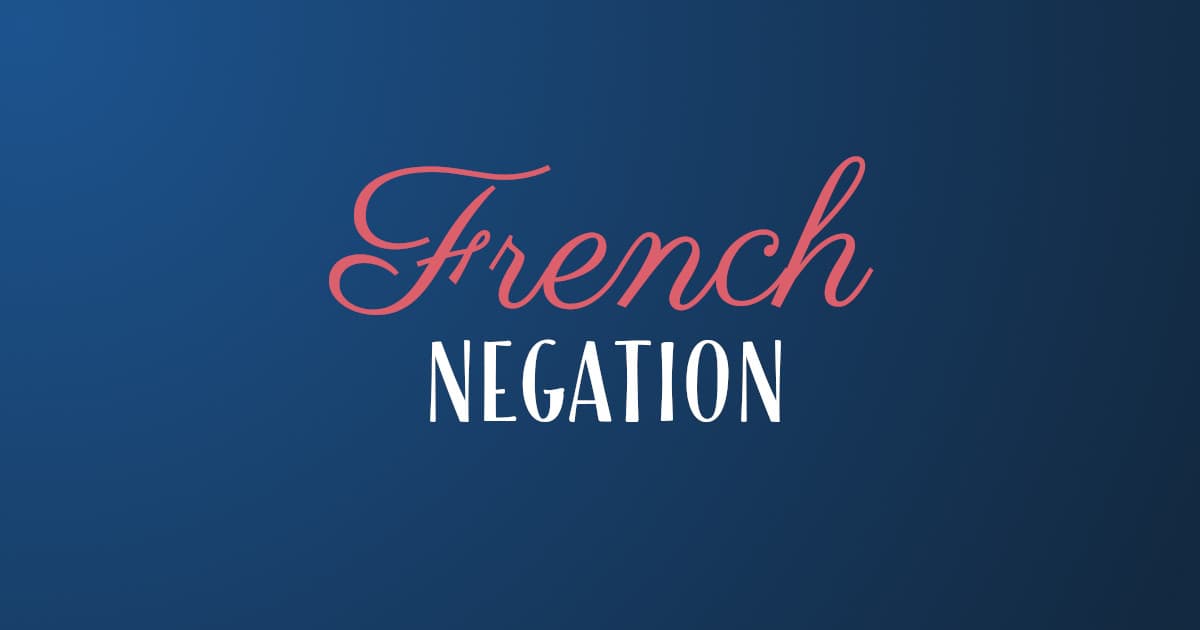French Negation: How To Make Negative Sentences
Negation is something every French beginner will need to learn early on (obviously!).
Learning verbs is one thing, but how do you say you're not doing something? 🙂
Thankfully, in French it's super easy!
But it works a little differently to English. I'll explain.
Expressing negation in French
French takes a two-part modifier to indicate a negative statement.
The most common of these two-part modifiers is "ne... pas".
"Ne... point" can be used interchangeably with "ne... pas" but the former indicates emphasis:
Je n’en veux pas (I don’t want any)
vs.
Je n’en veux point (I really don’t want any)
For simple tenses in French, the two-part modifiers surround the verb:
Je ne vois pas grand chose (I don’t see much of anything)
Vous n’êtes pas sur la liste (You are not on the list)
For compound tenses in French, the two-part negating modifier splits the auxiliary and the past participle of the verb:
Tu n’avais pas amené d’argent (You had not brought any money)
Elles ne sont pas rentrées hier soir (They did not return last night)
| Negation Modifiers | |
|---|---|
| French | English |
| ne…plus | not…anymore |
| ne…rien | not…anything |
| ne…jamais | never |
| ne…personne | not…anyone |
| ne…pas encore | not yet |
Examples:
La cloche ne sonne plus (The bell does not ring anymore)
Les ours polaires ne mangent rien l’hiver (Polar bears don’t eat anything during the winter)
Nous n’étions jamais allé voir un match (We had never gone to see a match)
Vous n’enviez personne (You don’t envy anyone)
Tu n’as pas encore fait tes devoirs (You haven’t done your homework yet)
There may be cases where a French verb is followed by an infinitive:
Tu fais (verb) répéter (infinitive) tes élèves (You make your students rehearse)
In this case, personne follows the infinitive:
Tu ne fais (verb) répéter (infinitive) personne (You don’t make anyone rehearse)
Ne can also be used with que and guère.
In these instances, the meaning conveyed is not one of negation.
Ne with que means only; ne with guère means hardly/barely.
Ne + Que or Guère
ne... guère / hardly, barely:
Je ne bois guère de café (I hardly drink any coffee)
ne... que / only:
On ne regarde que lui (People only look at him)
Que doesn’t necessarily follow right after the verb.
Instead, it comes after the verb and right in front of the words being emphasized:
Je n’ai arrêté de m’inquiéter que lorsqu’elle est revenue (I stopped worrying only when she came back)
In everyday conversations, the ne is often omitted.
This is acceptable among friends and family but is frowned upon in more formal settings.
Examples:
Je n’ai pas envie (I don’t want to)
Vous ne savez pas (You don’t know)
Il ne répond pas (He doesn’t answer)

SUBSCRIBE: